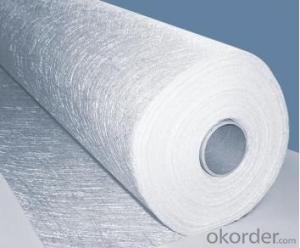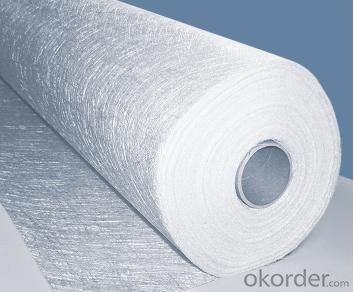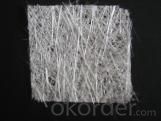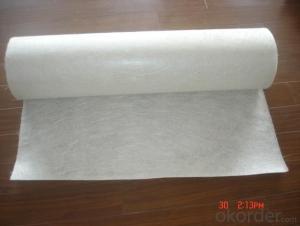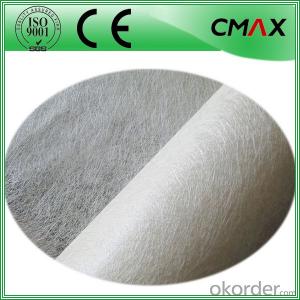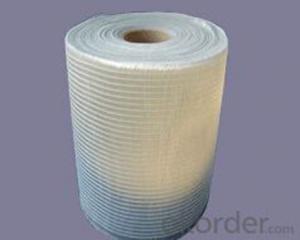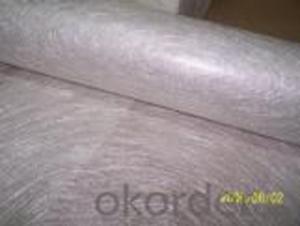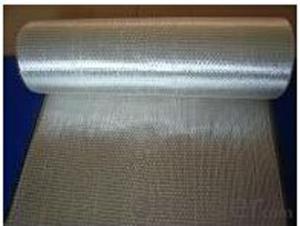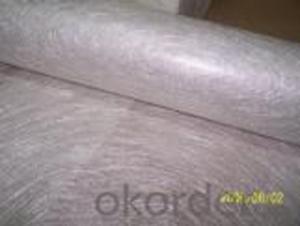Fiberglass Mat Tissue - Stitch Chopped Strand Mat 450gsm, 50-2400mm
OKorder Service Pledge
OKorder Financial Service
You Might Also Like
Description:
Fiberglass stitch chopped strand mat is the mat made of fiberglass roving which is at first be cut into certain length and evenly unfolded in all directions and then stitched with polyester yarn.
Properties
• Fiberglass no certain direction, good homogeneity.
• No powder or emulsion; sink quickly and easy to operate
• High tensile strength, easy to operate
• Good impact strength of finished products
Applications
Mainly be used as reinforced materials in the composite material industry.
• Matrix: unsaturated polyester resin, vinyl ester resin, epoxy resin and phenolic resin etc.
• Craft: winding, pultrusion, RTM, molded, hand lay up, etc.
• Ultimate products: Liner layer of tube, pultruded profiles, FRP body of boat, insulation board
Specifications
Fibre type | Areal weight | Width | |
(g/㎡) | (mm) | ||
EMK 300 | E-Glass | 300 | 50-2400 |
EMK380 | E-Glass | 380 | 50-2400 |
EMK450 | E-Glass | 450 | 50-2400 |
CMK 300 | C-Glass | 300 | 50-2400 |
CMK380 | C-Glass | 380 | 50-2400 |
CMK450 | C-Glass | 450 | 50-2400 |
Packaging: Wrapped in PVC and placed within a cardboard carton. | |||
Image:
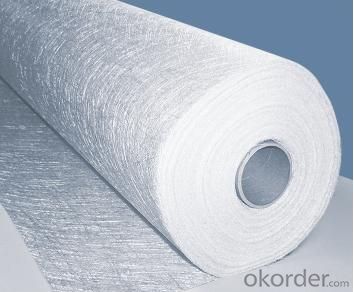
FAQ:
1. Why Choose us?
CNBM is a stated own company, provide the guarantee for the best quality, best service and safety business.
2. How will we guarantee the quality?
a, ISO 9001-2008 quality control system;
b, Strict and regular quality control in production;
c, Inspeciation when loading into container before shippment;
d, Sample stock for one year for quality tracing and record.
3. What is your MOQ?
Our MOQ is one pallet.
4. Can you provide sample?
Yes, samples are in stock. we can offer free sample for you.
5. Payment terms?
We can accept L/C, T/T etc.
6. Do you offer OEM service?
Yes, we can print customers’ logo on the packaging;
And the size and specification can be produced and design according to your demand.
7. What is the Production Lead Time?
1 *40HQ each day.
- Q: What is the expected lifespan of fiberglass mat tissue in power generation applications?
- The expected lifespan of fiberglass mat tissue in power generation applications can vary depending on various factors such as the specific application, environmental conditions, maintenance practices, and quality of the material used. However, fiberglass mat tissue is typically designed to have a long lifespan and can often last for several decades in power generation applications when properly installed and maintained.
- Q: What is the maximum temperature fiberglass mat tissue can withstand?
- The maximum temperature that fiberglass mat tissue can withstand depends on various factors such as the specific type of fiberglass used, the thickness of the tissue, and the manufacturing process. Generally, fiberglass mat tissue can withstand temperatures up to 1000°F (538°C) without significant degradation or loss of mechanical properties. However, it is important to note that prolonged exposure to high temperatures can still cause some deterioration in the material's performance. For applications requiring higher temperature resistance, specialized fiberglass materials with enhanced heat resistance can be used. It is recommended to consult the manufacturer or supplier for specific temperature ratings and guidelines for the particular fiberglass mat tissue being used.
- Q: How does the weight of fiberglass mat tissue affect its performance?
- The performance of fiberglass mat tissue is significantly affected by its weight. The weight of the tissue indicates the amount of glass fibers per unit area. Generally, a higher weight indicates a greater concentration of fibers, which results in improved strength and durability. To begin with, a heavier fiberglass mat tissue provides better tensile strength. The increased number of fibers in the tissue enables it to withstand higher levels of stress and strain without breaking or tearing. This makes it ideal for applications that require a high load-bearing capacity, such as structural components in the construction or automotive industries. Additionally, the weight of the tissue also impacts its stiffness and rigidity. A heavier mat tissue offers better dimensional stability, meaning it will maintain its shape and form even when subjected to external forces. This is crucial in applications where the material needs to retain its structural integrity, such as in boat hulls or wind turbine blades. Moreover, the weight of the fiberglass mat tissue affects its thermal and acoustic insulation properties. A higher weight is usually associated with better insulation capabilities, as the increased fiber density enhances the material's ability to trap air and reduce heat transfer or sound transmission. This makes it suitable for applications that require effective insulation, such as in buildings or industrial equipment. Finally, the weight of the fiberglass mat tissue can impact how easily it can be handled and installed. A lighter tissue may be more flexible and easier to manipulate, making it simpler to fit into complex shapes or tight spaces. Conversely, a heavier tissue might require additional support or equipment during installation. In conclusion, the weight of fiberglass mat tissue has a direct influence on its performance characteristics, including tensile strength, rigidity, insulation properties, and ease of handling. Therefore, it is crucial to consider the intended application and the desired performance requirements when selecting the appropriate weight of fiberglass mat tissue.
- Q: How does the roll length of fiberglass mat tissue affect its handling?
- The roll length of fiberglass mat tissue can have an impact on its handling. A longer roll length can make it more cumbersome and difficult to handle, especially if it is heavy. It may require more physical effort to transport and maneuver, which can slow down the installation process. On the other hand, a shorter roll length may be more manageable and easier to handle, allowing for quicker and more efficient use during installation. Ultimately, the roll length should be chosen based on the specific requirements of the project and the capabilities of the individuals handling it.
- Q: What is the cost of fiberglass mat tissue?
- The price of fiberglass mat tissue can fluctuate based on a variety of factors including the brand, quality, quantity, and location. Typically, the cost per square foot for fiberglass mat tissue falls between $0.50 and $2. However, it is crucial to consider that prices may vary depending on the project's specific requirements and the supplier or retailer from whom it is obtained. To ensure the best value and appropriateness for your needs, it is advisable to conduct thorough research and compare prices from different sources.
- Q: Is fiberglass mat tissue resistant to UV degradation?
- Yes, fiberglass mat tissue is generally resistant to UV degradation. The material is designed to withstand exposure to sunlight and does not easily degrade or deteriorate due to UV radiation.
- Q: Does anyone know the hardness value of the heat conductive gasket? Does it contain the hardness of the carrier (glass fiber)?
- The hardness of the heat conducting gasket does not contain the hardness of the carrier glass fiber.
- Q: What are the different color options available for fiberglass mat tissue?
- The different color options available for fiberglass mat tissue typically include white, gray, and beige.
- Q: Can fiberglass mat tissue be painted over?
- Indeed, fiberglass mat tissue can be painted on. Nevertheless, there are a few factors that necessitate consideration. Firstly, it is imperative to ensure the cleanliness and absence of any dirt, grease, or contaminants on the fiberglass mat tissue prior to painting. This can be accomplished by washing the surface with a gentle detergent and water, followed by thorough rinsing and drying. Secondly, it is advisable to apply a primer before painting in order to enhance adhesion and achieve a smoother finish. It is recommended to utilize a high-quality primer specifically formulated for fiberglass surfaces, adhering to the manufacturer's instructions for application. Lastly, when selecting the paint, it is crucial to choose one that is compatible with fiberglass materials. Acrylic or epoxy-based paints are often suggested as they exhibit good adhesion and durability on fiberglass surfaces. By adhering to these steps and employing appropriate materials, it is feasible to successfully paint over fiberglass mat tissue. Nevertheless, it is always prudent to seek advice from a professional or follow the manufacturer's recommendations for optimal outcomes.
- Q: Can fiberglass mat tissue be used for insulation in power generation facilities?
- Certainly, insulation in power generation facilities can make use of fiberglass mat tissue. This versatile material is frequently employed for insulation due to its exceptional properties in thermal and electrical insulation. With resistance to high temperatures, it effectively captures and hinders heat transfer, thus making it highly suitable for power generation facilities where heat management is vital. Moreover, fiberglass mat tissue is lightweight, easily installed, and provides durability and longevity, rendering it a cost-effective option for insulation in such facilities.
Send your message to us
Fiberglass Mat Tissue - Stitch Chopped Strand Mat 450gsm, 50-2400mm
OKorder Service Pledge
OKorder Financial Service
Similar products
Hot products
Hot Searches
Related keywords
